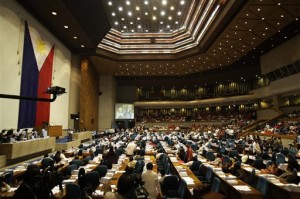House hearing on JDF not retaliation to SC—solons
MANILA, Philippines—Lawmakers on Tuesday said they do not seek to strike back at the Supreme Court with their hearing on the bills seeking to amend or abolish the court’s Judiciary Development Fund (JDF).
They clarified that the House justice committee hearing does not seek retaliation to the high court when it ruled that Congress’ Priority Development Assistance Fund (PDAF) is unconstitutional at the height of a corruption scandal.
Committee chair Iloilo Rep. Niel Tupas Jr. said the lower chamber was just doing its mandate of overseeing the law when it called for a hearing on the JDF.
“Hindi ito paghihiganti. (This is not revenge). This is just a regular course of business of the House of Representatives,” said Tupas, who filed the bill seeking to abolish the JDF and replace it with a new fund.
He remained confident that the SC would cooperate with the chamber in the next hearings, noting that this is the first time in his four years as justice committee chairman that the SC did not even send a representative.
Article continues after this advertisementMeanwhile, committee vice chair Ilocos Norte Rep. Rodolfo Fariñas, the author of the bill seeking to amend the JDF, said he does not seek retaliation when he filed his bill amending the JDF.
Article continues after this advertisementHe added that he does not see the SC decision on the PDAF, as well as on President Aquino’s outlawed stimulus program Disbursement Acceleration Program (DAP), as retaliation to the Congress’ conviction of ousted Chief Justice Renato Corona. Fariñas is part of the House prosecuting panel.
“There is no retaliation in the performance of one’s duties and functions. We did not, and we will never, take the SC decisions on the PDAF and the Disbursement Acceleration Program (DAP) as its retaliation to the impeachment of its Chief Justice as it is its constitutional duty to interpret the laws,” Farinas said in a text message.
He added that he does not see that their hearing on JDF is a way to get back at the SC’s decision over PDAF.
“In the same manner, no one should claim that when we perform our constitutional duty to pass, amend or repeal laws, we are doing it to retaliate,” he added.
Pampanga Representative Oscar Rodriguez also clarified that their meeting was not an “investigation” into the JDF but merely a hearing about the two bills filed on the JDF.
The JDF, long seen as the court’s “pork barrel” funds,” is sourced from the funds collected by courts nationwide from docket and other court fees.
Presidential Decree 1949, dated July 18, 1984, created the JDF “in order to preserve and enhance the independence of the judiciary at all times and safeguard the integrity of its members,” being the lone apolitical branch of government.
Under PD 1949, 80-percent of the JDF shall be used to augment the allowances of justices, judges, and court personnel; the remaining 20-percent for office equipment and facilities.
Chief Justice Maria Lourdes Sereno was a no-show in Tuesday’s hearing, citing the court’s “fiscal autonomy” and “judicial independence.”
In a letter to the committee, Sereno said the “timing and context in which a Committee of the House is proposing to inquire into the JDF as indicated in its letter, is that they leave much to be desired, and at this point, do not seem to be fully cognizant of the kind of healthy relationship that should exist between, on the one hand, the House of Representatives and on the other, the Supreme Court.”
RELATED STORIES
Chief Justice Sereno snubs ‘unhealthy’ House probe into Judiciary Development Fund
House calls off hearing on SC ‘pork’ funds after Sereno no-show
